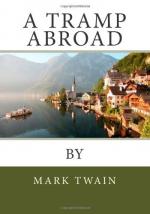A gentleman remarked, one day, that it might have been fine to live in the castle in the day of its prime, but that we had one advantage which its vanished inhabitants lacked—the advantage of having a charming ruin to visit and muse over. But that was a hasty idea. Those people had the advantage of us. They had the fine castle to live in, and they could cross the Rhine valley and muse over the stately ruin of Trifels besides. The Trifels people, in their day, five hundred years ago, could go and muse over majestic ruins that have vanished, now, to the last stone. There have always been ruins, no doubt; and there have always been pensive people to sigh over them, and asses to scratch upon them their names and the important date of their visit. Within a hundred years after Adam left Eden, the guide probably gave the usual general flourish with his hand and said: “Place where the animals were named, ladies and gentlemen; place where the tree of the forbidden fruit stood; exact spot where Adam and Eve first met; and here, ladies and gentlemen, adorned and hallowed by the names and addresses of three generations of tourists, we have the crumbling remains of Cain’s altar—fine old ruin!” Then, no doubt, he taxed them a shekel apiece and let them go.
An illumination of Heidelberg Castle is one of the sights of Europe. The Castle’s picturesque shape; its commanding situation, midway up the steep and wooded mountainside; its vast size—these features combine to make an illumination a most effective spectacle. It is necessarily an expensive show, and consequently rather infrequent. Therefore whenever one of these exhibitions is to take place, the news goes about in the papers and Heidelberg is sure to be full of people on that night. I and my agent had one of these opportunities, and improved it.
About half past seven on the appointed evening we crossed the lower bridge, with some American students, in a pouring rain, and started up the road which borders the Neunheim side of the river. This roadway was densely packed with carriages and foot-passengers; the former of all ages, and the latter of all ages and both sexes. This black and solid mass was struggling painfully onward, through the slop, the darkness, and the deluge. We waded along for three-quarters of a mile, and finally took up a position in an unsheltered beer-garden directly opposite the Castle. We could not see the Castle—or anything else, for that matter—but we could dimly discern the outlines of the mountain over the way, through the pervading blackness, and knew whereabouts the Castle was located. We stood on one of the hundred benches in the garden, under our umbrellas; the other ninety-nine were occupied by standing men and women, and they also had umbrellas. All the region round about, and up and down the river-road, was a dense wilderness of humanity hidden under an unbroken pavement of carriage tops and umbrellas.




